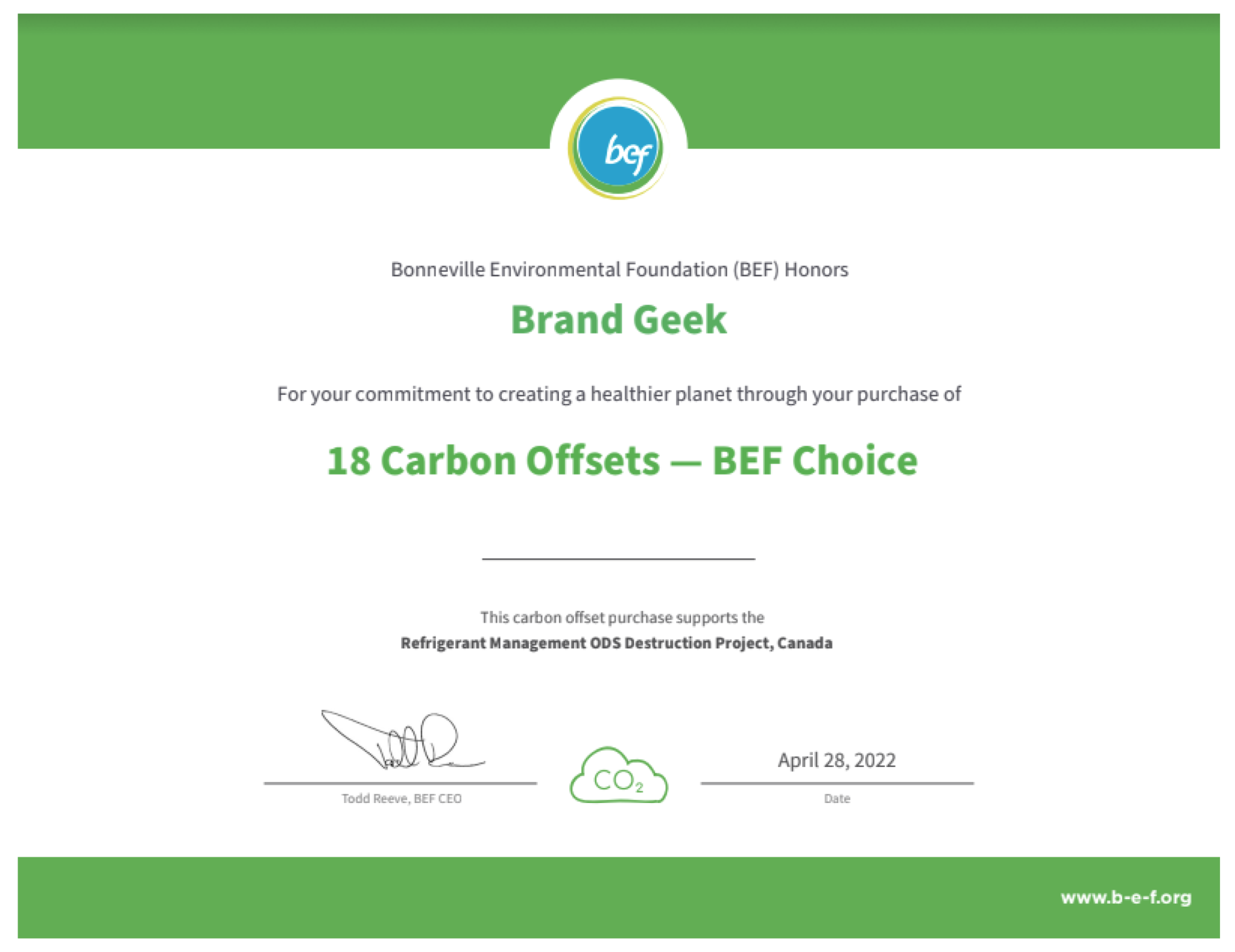Brandgeek proudly supports Mountain Area Preservation and is humbled to be…
Geekview July 2011 IP Recap
Interesting IP issues are so common, that I’ve decided to start providing installments of Geekview — a (usually weekly) review of the wonderfully wacky world of IP. Since I was a big time blogging slacker this month, we’ll start with a look back at the entire month of July, 2011.
Let’s begin by taking a moment to feel grateful to live in America, where anyone can sue anyone for anything.
You can’t fake fresh, but you can be sued for stealing it. The slogan, that is.
Wendy’s fast food restaurants were pinched by Phelan Holdings, Inc., which does business as Pincher’s Crab Shack and uses the federally registered service mark YOU CAN’T FAKE FRESH. The complaint filed in federal court seeks to prevent Wendy’s from continuing to use the marks YOU CAN’T FAKE FRESH and YOU CAN’T FAKE REAL, as well as any other YOU CAN’T FAKE marks. My bet’s on Phelan. And in other restaurant IP news . . .
Lamborghini locked horns with Dal Toro.
Lamborghini charged the Vegas companies that own the Dal Toro brand for exotic car sales, merchandise (including apparel), and restaurant services with trademark infringement of its federally registered logo. Of course, the exotic car showroom and the restaurant are combined, as one would expect on the Vegas strip:
 Appetizers before or after the test drive? I don’t know about you, but that new car smell always makes me hungry! I think Dal Toro’s gonna lose this bull fight, but were I hungering for Hollywood hoopla, boy would I be in luck . . .
Appetizers before or after the test drive? I don’t know about you, but that new car smell always makes me hungry! I think Dal Toro’s gonna lose this bull fight, but were I hungering for Hollywood hoopla, boy would I be in luck . . .
The Church of God seeks its own Judgment Day against Sony Pictures.

The Church of God filed a copyright infringement lawsuit against Sony Pictures and related entities for infringing on the Church of God logo in the feature film Salvation Boulevard. The Church of God has a copyright registration for its logo, protecting that creative work from being copied or displayed without permission. The logo on the fictitious Church of the Third Millennium in Sony’s film Salvation Boulevard looks mighty similar to that of the Church of God, so the issue is whether that’s copying or coincidence. I foresee the Church of God soon finding salvation in a sweet settlement, or maybe just in sweets . . .
Success having rained down on Sprinkles, it sues to remain unique.
 Sprinkles Cupcakes is anything but tickled pink by newcomer Pink Sprinkles refusal to change the name of its baked goods. Sprinkles is no small time bakery, it’s been featured on The Oprah Winfrey Show, The Martha Stewart Show, The Today Show, Good Morning America, Nightline, Access Hollywood and Entertainment Tonight, as well as in The New York Times, Time, People, InStyle, Bon Appetit, Gourmet and Travel & Leisure. That’s one successful cupcake! Seeing red, Sprinkles filed a complaint against Pink Sprinkles and now the court will decide who’s got the sweet spot. I presume Sprinkles will take the cake on this one, while Universal records apparently will take the songs it wants for its artists . . .
Sprinkles Cupcakes is anything but tickled pink by newcomer Pink Sprinkles refusal to change the name of its baked goods. Sprinkles is no small time bakery, it’s been featured on The Oprah Winfrey Show, The Martha Stewart Show, The Today Show, Good Morning America, Nightline, Access Hollywood and Entertainment Tonight, as well as in The New York Times, Time, People, InStyle, Bon Appetit, Gourmet and Travel & Leisure. That’s one successful cupcake! Seeing red, Sprinkles filed a complaint against Pink Sprinkles and now the court will decide who’s got the sweet spot. I presume Sprinkles will take the cake on this one, while Universal records apparently will take the songs it wants for its artists . . .
Universal/Interscope takes what Universal wants.
According to tweets from the hip hop artist Skepta (read from bottom up):
 Universal Records issued a DMCA (Digital Millennium Copyright Act) Notice that removed Skepta’s song, Dare to Dream, from YouTube before approaching his representatives to negotiate the purchase of the song. Skepta’s record company apparently then assigned its rights to the song to Interscope, who’s rumored to have it purchased for Eminem. . . It seems Skepta’s team recognized that selling is a sure thing, whereas the only certainty about challenging Universal’s take down notice is that it would be costly and uncertain — at least as to damages and the recovery of attorneys fees. While Skepta made a smart business decision, it’s too bad no one’s taking down Universal for its blatant misuse of a DMCA take down notice. If I knew I could succeed without ramification in getting something taken down without legal basis, I think this Old Navy ad might just be it . . .
Universal Records issued a DMCA (Digital Millennium Copyright Act) Notice that removed Skepta’s song, Dare to Dream, from YouTube before approaching his representatives to negotiate the purchase of the song. Skepta’s record company apparently then assigned its rights to the song to Interscope, who’s rumored to have it purchased for Eminem. . . It seems Skepta’s team recognized that selling is a sure thing, whereas the only certainty about challenging Universal’s take down notice is that it would be costly and uncertain — at least as to damages and the recovery of attorneys fees. While Skepta made a smart business decision, it’s too bad no one’s taking down Universal for its blatant misuse of a DMCA take down notice. If I knew I could succeed without ramification in getting something taken down without legal basis, I think this Old Navy ad might just be it . . .
Kim Kardashian calls out Old Navy for using a model that resembles her.
 Kim Kardashian sued The Gap and Old Navy apparel companies for the incredibly irritating television ad shown above. Kim’s complaint states that she is “widely recognized as the star of this hit television series, Keeping up with the Kardashians, the most widely watch TV series in the history of E! Entertainment television.” Wow! The most widely watched show on E!, now that’s saying a lot. The suit also states that “the term ‘Kim Kardashian’ was the most frequently searched term on Microsoft’s Bing search engine in 2010, exceeding all [ten?] other searched terms by 20%.” To sink Old Navy’s ship, Kardashian will have to show that most people think the woman in the Old Navy ad is her. My bet is they do, or they did, before Kim’s lawsuit got so much publicity. Here’s hoping this battle sails on for a while, as it should be a fun one to watch, that is if you’re not too busy watching American Idol . . .
Kim Kardashian sued The Gap and Old Navy apparel companies for the incredibly irritating television ad shown above. Kim’s complaint states that she is “widely recognized as the star of this hit television series, Keeping up with the Kardashians, the most widely watch TV series in the history of E! Entertainment television.” Wow! The most widely watched show on E!, now that’s saying a lot. The suit also states that “the term ‘Kim Kardashian’ was the most frequently searched term on Microsoft’s Bing search engine in 2010, exceeding all [ten?] other searched terms by 20%.” To sink Old Navy’s ship, Kardashian will have to show that most people think the woman in the Old Navy ad is her. My bet is they do, or they did, before Kim’s lawsuit got so much publicity. Here’s hoping this battle sails on for a while, as it should be a fun one to watch, that is if you’re not too busy watching American Idol . . .
Simon Says Stop.
 Simon Fuller, creator of the TV show Pop Idol (which later became American Idol), sued Fox Broadcasting Co. over former Idol star, Simon Crowell’s, upcoming show The X Factor. Fox plans to release The X Factor in the US this fall, apparently without intent to give Fuller due credit and compensation as it agreed to do in a prior settlement between the Simons, who litigated in Britain in 2004 over Crowell’s launch of The X Factor‘s there. In that settlement, Crowell and Fox apparently agreed to give Fuller a fee and credit on The X Factor were it ever released in America. The suit alleges breach of contract and seeks monetary damages and an order instructing Fox to list Fuller as Executive Producer of The X Factor and pay him a reasonable fee. Presuming the settlement says what Fuller says it says, then he gets my vote as the party most likely to win this one. My guess is that’s gonna be one hefty fee he gets as well. Speaking of heft . . .
Simon Fuller, creator of the TV show Pop Idol (which later became American Idol), sued Fox Broadcasting Co. over former Idol star, Simon Crowell’s, upcoming show The X Factor. Fox plans to release The X Factor in the US this fall, apparently without intent to give Fuller due credit and compensation as it agreed to do in a prior settlement between the Simons, who litigated in Britain in 2004 over Crowell’s launch of The X Factor‘s there. In that settlement, Crowell and Fox apparently agreed to give Fuller a fee and credit on The X Factor were it ever released in America. The suit alleges breach of contract and seeks monetary damages and an order instructing Fox to list Fuller as Executive Producer of The X Factor and pay him a reasonable fee. Presuming the settlement says what Fuller says it says, then he gets my vote as the party most likely to win this one. My guess is that’s gonna be one hefty fee he gets as well. Speaking of heft . . .
Size does matter.
If you can’t show it grows, your promotion’s got to go. So said the Orange County District Attorney to Biotab Neutraceutricals. Again. The DA and Biotab did this dance once before, in 2006, when Biotab was fined $300,000 and instructed it to cease making unsubstantiated claims. This time, Biotab agreed to a $1,075,000 fine for falsely advertising that it’s ExtenZe dietary supplement could increase the width and girth of, well, you know. Need I say more? Biotab’s not the only one found to be making false advertising claims this month . . .
UK bans ads of models who look too good to be true.
Upset about airbrushed models’ faces in a recent L’Oreal ad, a member of the UK Parliament, Jo Swinson, complained to the UK’s Advertising Standards Authority (ASA), which is the British government agency that’s similar to our FTC (Federal Trade Commission). The ASA banned the ads featuring Julia Roberts and Christy Turlington after learning that their images were retouched but not being allowed to see to what extent. Could this be the beginning of the end of fashion and beauty advertising, at least in the UK? While we’re discussing fashion . . .
PETA fights for its feathered friends.
PETA pleaded with Dakota Hills (the person, not the place) to stop misrepresenting that the roosters used to make her Fine Featherheads hair extensions are treated humanely. So now we’re supposed to think about the origins of our fashion accessories? Where is consumer consciousness headed next? Probably not to its local credit union . . .
There’s something fishy about a credit union that also pedals DVDs on eBay.
 Financial times are tough for small banks and credit unions. How tough? Apparently so tough that Nevada Federal Credit Union resorted to selling bootleg DVDs, at least according to the lawsuit filed against it in federal district court in Minnesota. And in other electronic media related news . . .
Financial times are tough for small banks and credit unions. How tough? Apparently so tough that Nevada Federal Credit Union resorted to selling bootleg DVDs, at least according to the lawsuit filed against it in federal district court in Minnesota. And in other electronic media related news . . .
T-Pain tells Auto-Tune to tone it down.
T-Pain is somewhat synonymous with Auto-Tune technology. You know, Auto-Tune. That’s the “pitch correction sound technology” that’s supposed to make artists voices sound in key, which I think makes them all sound alike — tinny and over-mixed. T-Pain and Auto-Tune parted ways in June, but Auto-Tune continues to market its product with the claim that it creates the “T-Pain/Cher-style effect.” T-Pain’s counsel sent a C&D letter, instructing the makers of Auto-Tune to cease and desist, but they turned a deaf ear, and wound up in court, sued by T-Pain for misappropriation of his right of publicity and unfair competition. Celebrity perpetrated unfair competition wasn’t limited to Auto-Tune this month . . .
Oprah accused of counterfeiting power.
As if Oprah didn’t have enough power, she had to go and steal someone else’s! At least that’s what’s alleged in the lawsuit filed by Own Your Power Communications (OYP) and Simone Kelly-Brown against Oprah, her production company, Hearst, Wells Fargo, Estee Lauder, Clinique and Chico’s. The suit alleges that the defendants engaged in counterfeiting, trademark infringement, reverse confusion, unfair competition, contributory and vicarious trademark infringement and misappropriationover the OWN YOUR POWER & OYP marks. OYP claims to have offered OWN YOUR POWER branded educational workshops since 2006, for which it obtained a federal registration in May, 2008. Oprah began marketing services under OWN YOUR POWER in September 2010. Sounds like even Oprah’s superpowers may not get her out of this one.
As the month of July, 2011 winds to a close, we continue merrily down the road of unfair competition, presuming such that “litigation extortion” is a type of unfair competition . . .
Last, but nowhere near least, we have the company that’s vying for the record of most lawsuits ever filed in one 18 month period . . . An organization named Righthaven that continues to take the wrong approach to copyright law.
Oh the trolls! What other area of law besides IP has trolls? And people say law is boring. How can anything with its own breed of troll be a bore?
First, there were patent trolls — patent owners who never commercialized their patents, and instead used them to threaten to sue alleged infringers. Then, there were trademark trolls, always with questionable rights (if any) in a the trademark(s) they assert, these folks also threaten or initiate unsubstantiated legal proceedings in order to extract financial settlements. Now, Righthaven has introduced us to a new creature in the IP troll family: a copyright troll! Righthaven has filed 275(!) federal copyright infringement lawsuits since March 2010 — an average of 17 lawsuits a month! Gradually, the courts are throwing out the cases. In May, one of Righthaven’s defendant’s fought back with a class action countersuit alleging unfair and deceptive trade practices and litigation extortion. The folks at VEGASINC have been doing an amazing job tracking the widespread Righthaven insanity, recently offering some choice quotes from federal judges and commentators.
 I hope you enjoyed the first installment of Geekview. I’d love to hear your thoughts on these cases from the wacky wild world of IP.
I hope you enjoyed the first installment of Geekview. I’d love to hear your thoughts on these cases from the wacky wild world of IP.















Well done! Very informative and entertaining.
Nice contribution, incredible website design and style, maintain the great work
Thanks for reading; I hope you continue to enjoy it (and on the off-chance you’re spam, I still appreciate the compliment).
Good day! This post couldn’t be written any better! Reading this post reminds me of my previous room mate! He always kept chatting about this. I will forward this article to him. Pretty sure he will have a good read. Many thanks for sharing!